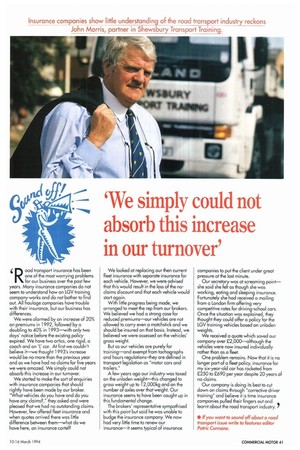'We simply could not absorb this increase in our turnover'
Page 43

If you've noticed an error in this article please click here to report it so we can fix it.
4 oad transport insurance has been
one of the most worrying problems for our business over the post few years. Many insurance companies do not seem to understand how an LGV training company works and do not bother to find out. All haulage companies have trouble with their insurance, but our business has differences.
We were alarmed by an increase 01 20% on premiums in 1992, followed by a doubling to 40% in 1993—with only two days' notice before the existing policy expired. We have two artics, one rigid, a coach and an 'I! car. At first we couldn't believe it—we thought 1993's increase would be no more than the previous year and as we have had no claims for five years we were amazed. We simply could not absorb this increase in our turnover.
We started to make the sort of enquiries with insurance companies that should rightly have been made by our broker. 'What vehicles do you have and do you have any claims?," they asked and were pleased that we had no outstanding claims. However, few offered fleet insurance and when quotes arrived there was little difference between them—what do we have here, an insurance cartel? We looked at replacing our then current fleet insurance with separate insurance for each vehicle. However, we were advised that this would result in the loss of the noclaims discount and that each vehicle would start again. With little progress being made, we arranged to meet the rep from our brokers. We believed we had a strong case for reduced premiums—our vehicles are not allowed to carry even a matchstick and we should be insured on that basis, Instead, we believed we were assessed on the vehicles' gross weight. But as our vehicles are purely for training—and exempt from tachographs and hours regulations–they are defined in transport legislation as "motor cars and trailers."
A few years ago our industry was taxed on the unladen weight—this changed to gross weight up to 12,000kg and on the number of axles over that weight. Our insurance seems to have been caught up in this fundamental change. The brokers' representative sympathised with this point but said he was unable to budge the insurance company. We now had very little time to renew our insurance—it seems typical of insurance companies to put the client under great pressure at the last minute.
Our secretary was at screaming point— she said she felt as though she was working, eating and sleeping insurance. Fortunately she had received a mailing from a London firm offering very competitive rates for driving-school cars. Once the situation was explained, they thought they could offer a policy for the LGV training vehicles based on unladen weights.
We received a quote which saved our company over £2,000—although the vehicles were now insured individually rather than as a fleet.
One problem remains. Now that it is no longer part of a fleet policy, insurance for my six-year-old car has rocketed from 2250 to 2690 per year despite 20 years of no claims.
Our company is doing its best to cut down on claims through "corrective driver training" and believe it is time insurance companies pulled their fingers out and learnt about the road transport industry. 7 • if you want to sound off about a road transport issue write to features editor Patric Cunnane.




















































































